
Victor August Herbert was an American composer, cellist and conductor of English and Irish ancestry and German training. Although Herbert enjoyed important careers as a cello soloist and conductor, he is best known for composing many successful operettas that premiered on Broadway from the 1890s to World War I. He was also prominent among the Tin Pan Alley composers and was later a founder of the American Society of Composers, Authors, and Publishers (ASCAP). A prolific composer, Herbert produced two operas, a cantata, 43 operettas, incidental music to 10 plays, 31 compositions for orchestra, nine band compositions, nine cello compositions, five violin compositions with piano or orchestra, 22 piano compositions and numerous songs, choral compositions and orchestrations of works by other composers, among other music.

Sentimental Education is a novel by Gustave Flaubert. The story focuses on the romantic life of a young man named Frédéric Moreau at the time of the French Revolution of 1848 and the founding of the Second French Empire. It describes Moreau's love for an older woman based on the wife of the music publisher Maurice Schlesinger, who is portrayed in the book as Jacques Arnoux. The novel's tone is by turns ironic and pessimistic; it occasionally lampoons French society. The main character often gives himself over to romantic flights of fancy.

Anne Françoise Elisabeth Lange was a French actress of the Comédie-Française and a "Merveilleuse" of the French Directory. Her stage name was Mademoiselle Lange.
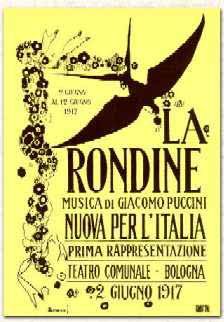
La Rondine is an opera in three acts by Giacomo Puccini to an Italian libretto by Giuseppe Adami, based on a libretto by Alfred Maria Willner and Heinz Reichert. It was first performed at the Grand Théâtre de Monte Carlo in Monte Carlo on 27 March 1917.

Naughty Marietta is an operetta in two acts, with libretto by Rida Johnson Young and music by Victor Herbert. Set in New Orleans in 1780, it tells how Captain Richard Warrington is commissioned to unmask and capture a notorious French pirate calling himself "Bras Pique" – and how he is helped and hindered by a high-spirited runaway, Contessa Marietta. The score includes many well-known songs, including "Ah! Sweet Mystery of Life".

The Knickerbocker Theatre, previously known as Abbey's Theatre and Henry Abbey's Theatre, was a Broadway theatre located at 1396 Broadway in New York City. It operated from 1893 to 1930. In 1906, the theatre introduced the first moving electrical sign on Broadway to advertise its productions.
The Ohio Light Opera is a professional opera company based in Wooster, Ohio that performs the light opera repertory, including Gilbert and Sullivan, American, British and continental operettas, and other musical theatre works, especially of the late 19th and early 20th centuries. The company is also known for its recordings of these works.
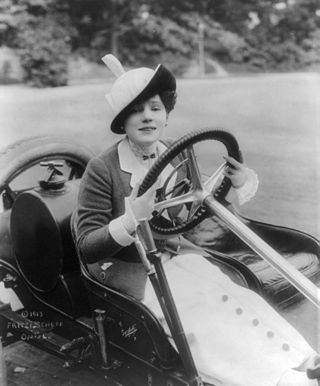
Fritzi Scheff was an American actress and singer.

The Fortune Teller is an operetta in three acts composed by Victor Herbert, with a libretto by Harry B. Smith. After a brief tryout in Toronto, it premiered on Broadway on September 26, 1898, at Wallack's Theatre and ran for 40 performances. Star Alice Nielsen and many of the original company traveled to London, where the piece opened at the Shaftesbury Theatre on April 9, 1901, running for 88 performances. It was revived in New York on November 4, 1929, at Jolson's 59th Street Theatre, starring Tessa Kosta, and ran for 16 performances. The piece continued to be revived, including by the Light Opera of Manhattan in the late 20th century and the Comic Opera Guild in the early 21st century.
Henry Martyn Blossom was an American writer, playwright, novelist, opera librettist, and lyricist. He first gained wide attention for his second novel, Checkers: A Hard Luck Story (1896), which was successfully adapted by Blossom into a 1903 Broadway play, Checkers. It was Blossom's first stage work and his first critical success in the theatre. The play in turn was adapted by others creatives into two silent films, one in 1913 and the other in 1919, and the 1920 Broadway musical Honey Girl. Checkers was soon followed by Blossom's first critical success as a lyricist, the comic opera The Yankee Consul (1903), on which he collaborated with fellow Saint Louis resident and composer Alfred G. Robyn. This work was also adapted into a silent film in 1921.

Kiss Me Again is a 1931 American Pre-Code musical operetta film filmed entirely in Technicolor. It was originally released in the United States as Toast of the Legion late in 1930, but was quickly withdrawn when Warner Bros. realized that the public had grown weary of musicals. The Warner Bros. believed that this attitude would only last for a few months, but, when the public proved obstinate, they reluctantly re-released the film early in 1931 after making a few cuts to the film.
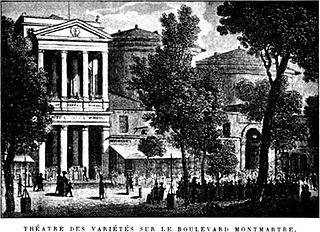
The Théâtre des Variétés is a theatre and "salle de spectacles" at 7–8, boulevard Montmartre, 2nd arrondissement, in Paris. It was declared a monument historique in 1974.

Marguerite Sylva was a Belgian born mezzo-soprano who achieved fame not only on the opera stage but also in operetta and musical theatre. She was particularly known for her performances in the title role of Bizet's Carmen, which she sang over 300 times in the course of her career. Sylva was a pioneering recording artist for Edison Records and made many recordings for the company between 1910 and 1912.
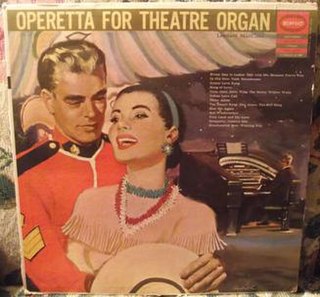
Operetta for the Theatre Organ is an album released by Leonard MacClain in 1957 on Epic Records LP record LN 3372. On release, J. Albert Fracht reviewed the album as "full of good playing." The album features music from Victor Herbert's "Red Mill", "The Fortune Teller" and "Mlle Modiste." Also featured are songs from Sigmund Romberg's "The Desert Song" and "The New Moon". Rudolf Friml is represented by songs from "The Firefly", and "Rose Marie".
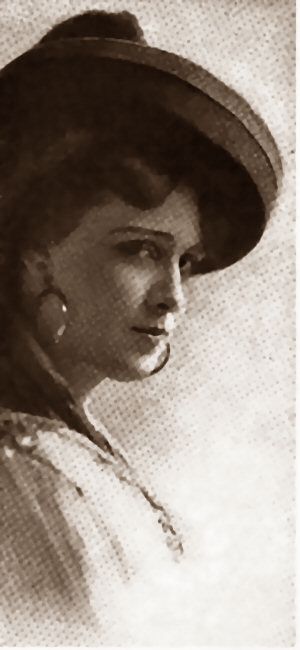
Louise Le Baron (1874–1918) was an American contralto singer who performed in opera and musical theatre during the early years of the twentieth century.
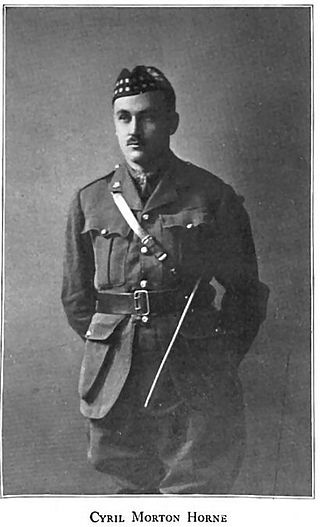
C. Morton Horne (1885–1916) was an Irish writer and musical comedy performer who lost his life on a battlefield in France during the First World War.
Stanislaus Stange (1862–1917) was a playwright, librettist and lyricist who created many Broadway shows in the fin-de-siecle era and early 20th century. After minor success as an actor, Stange made his career as a writer in the musical theatre, moving towards more varied theatrical work before his death.

Mademoiselle Modiste is a 1926 silent romance produced by and starring Corinne Griffith and distributed by First National Pictures. Robert Z. Leonard directed Griffith in a story based on a popular 1905 Victor Herbert operetta on Broadway, Mlle. Modiste, with a libretto by Henry Martyn Blossom, which was similar to the MGM film The Merry Widow. It is now considered a lost film.

Théodore Lajarte was a French musicologist, librarian, and composer.

Ada Meade Saffarans was an American actress known professionally as Ada Meade. She performed professionally in comic drama, comic opera, and musical comedy.


















